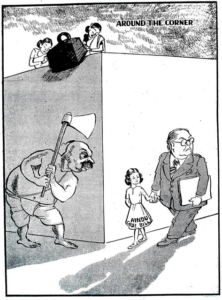We begin our second issue of 2020 with well wishes. To our readers and your loved ones: we hope you are as well as is possible in the face of present crises. Amid such uncertainty, we remain committed to enriching our readers through open-access; to democratizing compelling new legal history and historiography. We continue to…
Issue: Volume 3, Issue 2 (June, 2020): Age of Consent Laws in Historical Context

Update on the 2020 ASLH Annual Conference
Dear ASLH Members, With public health experts predicting that the risks of travel and large-group gatherings during the COVID-19 pandemic will continue through the fall, and with ongoing restrictions on university and international travel, we have regretfully made the decision to cancel the in-person ASLH 2020 annual conference. While it is sad to have to forgo our beloved in-person…
Cast of Historical Actors: Eliza Armstrong, Phulmoni Dasi, & Rukhmabai Raut
Eliza Armstrong was a 13-year-old girl from an impoverished family in London when she was procured by W. T. Stead, a reporter for a leading London newspaper, as part of his expose on child prostitution in late Victorian London.[1] Stead was a well-know ‘moral purity’ and women’s rights’ campaigner in the late 19th century, best…
Interview: Maggie Banjo
In the interview below, Maggie Banjo reflects on this issue’s focal point: the Age of Consent Forum. Banjo aptly points to the salience of historical notions–ownership of consent, proof of age, religious implications, etc.–in her fieldwork today.
Nikita Samanta & Laura Lammasniemi: Interview with Antoinette Burton
Antoinette Burton is professor of History and Swanlund Endowed Chair at the University of Illinois, Urbana-Champaign where she directs the Illinois Program for Research in the Humanities. A feminist scholar of Britain, empire and its aftermath, she is currently working on animals and empire, and on the empire of detective fiction as well. Her article,…
Kanika Sharma: Restitution of Conjugal Rights: A Pernicious Legal Transplant
This post traces the development of suits for restitution of conjugal rights (RCR) in Hindu personal law in independent India. Against this backdrop, Nikita Samanta and I subsequently interview Public Interest Litigants who have recently challenged the validity of RCR in the Indian Supreme Court. You can read about the early years of restitution of…
Aparna Bandyopadhyay: Muslim Voices and Historiographical Silences: The Age of Consent Controversy in Colonial Bengal
On 19 March 1891, the Governor General in Council in India, Lord Lansdowne, passed the Age of Consent Act or Act X. The Act amended Section 375 of the Indian Penal Code of 1860 by raising the age of consent of all girls, married and unmarried, from ten to twelve in all jurisdictions, its violation…
Laura Lammasniemi: The Age of Consent in the 19th Century: Trustworthiness and Capacity on Trial
Laura Lammasniemi’s article, “Precocious Girls”: Age of Consent, Class and Family in Late Nineteenth-Century England, appears in the latest issue of Law and History Review. Below, she explains some of her main insights into reform of age of consent in the late nineteenth century and how it was dealt with in courts. The age of consent…
Tania Sebastian: Tracing the role of Women in the run up to Child Marriage Restraint Act, 1929: Compromises and Colonization
The 1880s in the British colony of India saw the emergence of the “New Women,” reflected in numerous writings by women speaking against their suppression and subordination. This meant that womens issues were no longer an adjunct issue, but a core issue of women living in the “shade of Manu,” who had so far been…
Catriona Ellis: Age of Consent and Understandings of the Indian child
The 1929 Child Marriage Restraint Act (CMRA) in India was a seminal moment for girls in India and has received attention from feminists and women’s rights reformers ever since. However, as Ishita Pande has demonstrated, the Act was also significant for children’s rights in India, a moment in which marriage and sexual innocence was used to…

